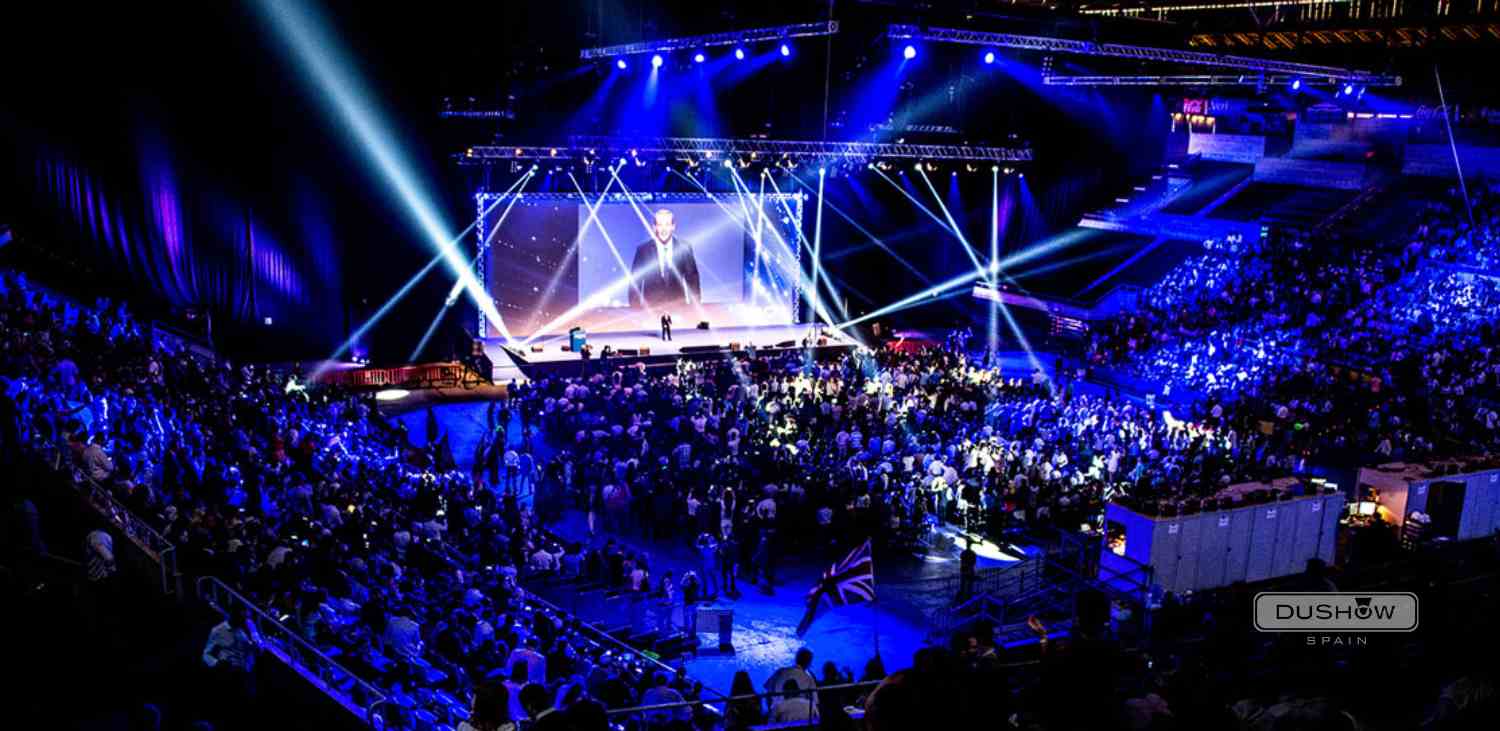Exactly How Event Production Works: A Comprehensive Look at the Process
Event production is a facility and organized procedure that needs cautious planning and implementation. It starts with developing clear goals and understanding the target audience. Each action, from budgeting to location choice, plays a vital function in guaranteeing success. As the process unravels, different elements must straighten flawlessly. Yet, the subtleties of this elaborate operation usually go undetected. What are the vital phases that contribute to a remarkable event?

The Initial Drawing Board
When beginning on event production, mindful preparation is vital to guarantee a successful end result. The first drawing board serves as the foundation for all subsequent efforts. During this phase, event manufacturers must define the event's purpose and objectives plainly. Recognizing the target market aids customize the experience and messaging, ensuring importance and engagement.Producers need to additionally think about the event style, whether it be in-person, online, or hybrid, as this will influence numerous logistical components. Choosing an appropriate date and venue is crucial, as it impacts accessibility and availability.Furthermore, assembling a dependable team is basic for splitting obligations and improving communication. Developing a timeline with turning points assurances all tasks are finished on routine. This stage involves detailed study, including identifying possible difficulties and developing strategies to mitigate risks. Eventually, a well-structured first planning phase establishes the tone for an effective event production trip.

Budgeting and Resource Allowance
In event production, effective budgeting and source appropriation are vital for success - event production charlotte. Establishing monetary parameters sets the structure for all subsequent choices, while resource circulation strategies ensure that every part of the event is sufficiently sustained. Together, these components help preserve control over expenses and optimize the usage of available resources
Developing Financial Parameters
Developing financial specifications is vital to the success of any type of event production, as it establishes the structure for effective budgeting and source appropriation. This process begins with specifying the total budget, which includes all facets of the event, including venue expenses, wedding catering, and marketing. By determining readily available funds, event organizers can prioritize expenses and assign sources as necessary. Additionally, it is necessary to carry out complete market research to expect prospective prices and recognize financing resources, such as sponsorships or ticket sales. Developing clear financial parameters also aids in risk administration, enabling coordinators to reserve contingency funds for unforeseen costs. Eventually, a well-defined budget functions as a roadmap, guiding the event production group in the direction of attaining their objectives while keeping economic control.
Source Circulation Methods
Efficient resource distribution strategies are important for optimizing the effect of an event while adhering to budget restraints. Effective event production needs a precise method to budgeting and resource allocation. Organizers need to prioritize important elements such as place, wedding catering, and innovation, guaranteeing that funds are assigned to locations that improve guest experience. A detailed spending plan must describe anticipated costs and identify locations for prospective cost financial savings, such as working out with vendors or discovering sponsorship chances. In addition, tracking expenditures throughout the planning procedure helps stop overspending. By employing critical resource circulation, event producers can supply an unforgettable experience while maintaining financial responsibility, eventually contributing to the general success of the event.
Venue Choice and Logistics
Choosing the ideal venue is necessary to the success of any event, as it sets the phase for the overall experience. Location option includes reviewing various aspects, consisting of capacity, availability, and location. Coordinators have to consider the target audience and the nature of the event, making certain the venue lines up with the event's goals.Logistics play a substantial role in this process, including setups for seats, audiovisual equipment, and catering solutions. A well-chosen location must facilitate smooth flow for guests and personnel, boosting engagement.Additionally, assessing potential venues for facilities like car park, restrooms, and emergency exits is crucial for safety and security and ease. The timeline for safeguarding the venue is also crucial, as prominent places may reserve swiftly - event production charlotte. Complete planning and timely execution can ultimately contribute to a smooth event experience, making place option and logistics basic elements of successful event production.
Innovative Idea Development
While the location sets the physical phase, imaginative principle advancement shapes the event's identity and story. This procedure begins with identifying the event's purpose and target market, permitting event producers to formulate an engaging style that resonates with attendees. Conceptualizing sessions usually consist of diverse perspectives, cultivating ingenious ideas that straighten with the event's goals.Once a style is established, aesthetic aspects such as color schemes, signage, and decor are made to improve the overall ambience. Storytelling strategies might also be incorporated to produce an interesting trip for participants, ensuring a memorable experience. In addition, considerations regarding enjoyment, activities, and interactive parts are aligned with the picked concept, enhancing the theme throughout the event.Ultimately, reliable creative principle development assurances that every aspect of the event functions cohesively, leaving a lasting perception on participants and satisfying the event's purposes. This foundational work lays the foundation for subsequent preparation and implementation stages.
Collaborating With Suppliers and Suppliers
Effective event production rests on effective partnership with suppliers and providers. Choosing reliable partners, bargaining contracts efficiently, and making certain timely deliveries are important actions in this process. click over here now Each of these factors contributes considerably to the total success and smooth execution of an event.
Choosing Reliable Allies
Just how can event organizers guarantee a seamless production experience? Selecting reputable companions is crucial in achieving this goal. Event coordinators need to perform thorough research to identify vendors and providers with a tested record of quality. This consists of inspecting referrals, assessing profiles, and reviewing consumer responses. Organizers need to focus on companions that demonstrate expertise, prompt interaction, and a desire to work together. Building strong connections cultivates trust fund and makes it possible for fast analytical during the event. Additionally, it is advantageous to choose local vendors that recognize the location and regional logistics. Ultimately, an effective event rests on the synergy in between organizers and their companions, making sure that every element of production runs efficiently and effectively.
Discussing Contracts Effectively
Reliable settlement of contracts is a vital action in the partnership between event organizers and their vendors and suppliers. This procedure includes clear communication of assumptions, deliverables, and timelines. Coordinators should perform extensive research on market prices and market criteria to develop a baseline for arrangements. It is necessary to develop a joint environment, encouraging open discussion about terms, prices, and possible contingencies. Organizers must also prioritize understanding the vendor's capacities and restrictions to straighten their requirements properly. Versatility can bring about mutually valuable contracts, cultivating long-term connections. Crafting distinct contracts that consist of details performance metrics can assist guarantee responsibility, inevitably leading to successful event implementation and complete satisfaction for all celebrations entailed.
Guaranteeing Prompt Distributions
Timely deliveries are necessary for the smooth implementation of any event, needing attentive collaboration between coordinators this link and their suppliers and distributors. Effective communication is important, as it assists develop clear assumptions regarding delivery routines, quantities, and certain needs. Organizers often create comprehensive timelines to detail important landmarks, making certain all parties remain aligned throughout the process. Regular check-ins with vendors can help identify possible hold-ups early, enabling aggressive remedies. In addition, constructing solid partnerships with trusted suppliers cultivates trust fund and accountability, which can result in better solution and prioritization. By focusing on these collective initiatives, coordinators can reduce disruptions, thereby boosting the total effectiveness of event production and guaranteeing that all required products and solutions show up as planned.
Marketing and Promo Methods
While arranging an event, the success of advertising and marketing and promotion strategies can substantially influence attendance and interaction. Effective strategies commonly include a mix of digital advertising and marketing, conventional advertising, and grassroots outreach. Using social media platforms permits for real-time interaction and targeted advertising and marketing, reaching specific demographics successfully. Email marketing campaigns can better engage prospective participants with customized web content and reminders.Collaborations with influencers or industry leaders can likewise boost reliability and broaden reach. Developing engaging material, such as video clips or blog sites, helps to produce buzz and receive interest leading up to the event. Furthermore, leveraging early-bird price cuts and unique perks can incentivize ticket purchases.Promoting with standard networks, such as posters or local media, stays appropriate, specifically in community-focused occasions. A comprehensive method that incorporates numerous methods warranties optimum visibility and engagement, ultimately adding to the event's success and the creation of an unforgettable experience for attendees.
On-Site Implementation and Monitoring
On-site implementation and monitoring are important elements that determine the overall success of an event. Effective coordination throughout the event assures that all elements straighten with the planned agenda. Event managers oversee logistics, including supplier control, tools arrangement, and visitor solutions. Keeping an eye on timelines and resolving any kind of unforeseen problems are essential for maintaining a smooth experience.The team plays a substantial function, as qualified personnel are responsible for various jobs such as enrollment, information dissemination, and technological assistance. Communication amongst staff member is necessary; it promotes a collaborative environment and makes it possible for quick resolution of challenges.Additionally, safety methods need to be complied with, safeguarding the health of all guests. Post-event evaluations are additionally component of check here on-site management, giving insights for future improvements. By concentrating on these aspects, event manufacturers can produce remarkable experiences that satisfy or exceed participant expectations while attaining the event's goals.
Regularly Asked Concerns
How Do I Select the Right Event Theme?
Selecting the right event motif includes taking into consideration the target audience, event objective, and location. Looking into current fads and gathering input from stakeholders can likewise inspire innovative concepts that resonate and develop a memorable experience.

What Are Common Mistakes in Event Production?
Common blunders in event production usually consist of insufficient planning, inadequate interaction among team participants, spending plan mismanagement, ignoring to take into consideration the audience's demands, and stopping working to carry out a comprehensive post-event evaluation for future renovations.
Exactly How Can I Measure Event Success?
To gauge event success, one can examine attendee satisfaction, involvement degrees, budget adherence, and post-event responses. Secret performance signs, such as ticket sales and social media communications, likewise provide useful insights right into overall performance.
What Should I Do if It Rains on the Event Day?
In case of rain on the day, the coordinator ought to implement contingency strategies, such as protecting outdoors tents or moving tasks indoors. Interaction with attendees regarding changes is necessary to guarantee a smooth experience in spite of climate difficulties.
Just How Can I Guarantee Guest Engagement During the Event?
